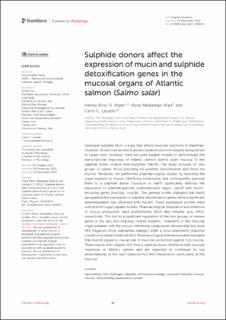| dc.contributor.author | Alipio, Hanna Ross | |
| dc.contributor.author | Albaladejo-Riad, Nora | |
| dc.contributor.author | Lazado, Carlo C. | |
| dc.date.accessioned | 2023-02-13T10:21:48Z | |
| dc.date.available | 2023-02-13T10:21:48Z | |
| dc.date.created | 2022-12-05T10:55:25Z | |
| dc.date.issued | 2022 | |
| dc.identifier.issn | 1664-042X | |
| dc.identifier.uri | https://hdl.handle.net/11250/3050332 | |
| dc.description.abstract | Hydrogen sulphide (H2S) is a gas that affects mucosal functions in mammals. However, its detrimental effects are less understood in fish despite being known to cause mass mortality. Here we used explant models to demonstrate the transcriptional responses of Atlantic salmon (Salmo salar) mucosa to the sulphide donor sodium hydrosulphide (NaHS). The study focused on two groups of genes: those encoding for sulphide detoxification and those for mucins. Moreover, we performed pharmacological studies by exposing the organ explants to mucus-interfering compounds and consequently exposed them to a sulphide donor. Exposure to NaHS significantly affected the expression of sulphide:quinone oxidoreductase (sqor1, sqor2) and mucin-encoding genes (muc5ac, muc5b). The general profile indicated that NaHS upregulated the expression of sulphide detoxification genes while a significant downregulation was observed with mucins. These expression profiles were seen in both organ explant models. Pharmacological stimulation and inhibition of mucus production used acetylcholine (ACh) and niflumic acid (NFA), respectively. This led to a significant regulation of the two groups of marker genes in the gills and olfactory rosette explants. Treatment of the mucosal organ explants with the mucus-interfering compounds showed that low dose NFA triggered more substantial changes while a dose-dependent response could not be established with ACh. Pharmacological interference demonstrated that mucins played a crucial role in mucosal protection against H2S toxicity. These results offer insights into how a sulphide donor interfered with mucosal responses of Atlantic salmon and are expected to contribute to our understanding of the least explored H2S-fish interactions—particularly at the mucosa. | |
| dc.description.abstract | Sulphide donors affect the expression of mucin and sulphide detoxification genes in the mucosal organs of Atlantic salmon (Salmo salar) | |
| dc.language.iso | eng | |
| dc.title | Sulphide donors affect the expression of mucin and sulphide detoxification genes in the mucosal organs of Atlantic salmon (Salmo salar) | |
| dc.title.alternative | Sulphide donors affect the expression of mucin and sulphide detoxification genes in the mucosal organs of Atlantic salmon (Salmo salar) | |
| dc.type | Peer reviewed | |
| dc.type | Journal article | |
| dc.description.version | publishedVersion | |
| dc.source.volume | 13 | |
| dc.source.journal | Frontiers in Physiology | |
| dc.identifier.doi | 10.3389/fphys.2022.1083672 | |
| dc.identifier.cristin | 2088604 | |
| dc.relation.project | Norges forskningsråd: 300825 | |
| cristin.ispublished | true | |
| cristin.fulltext | original | |
| cristin.qualitycode | 1 | |
